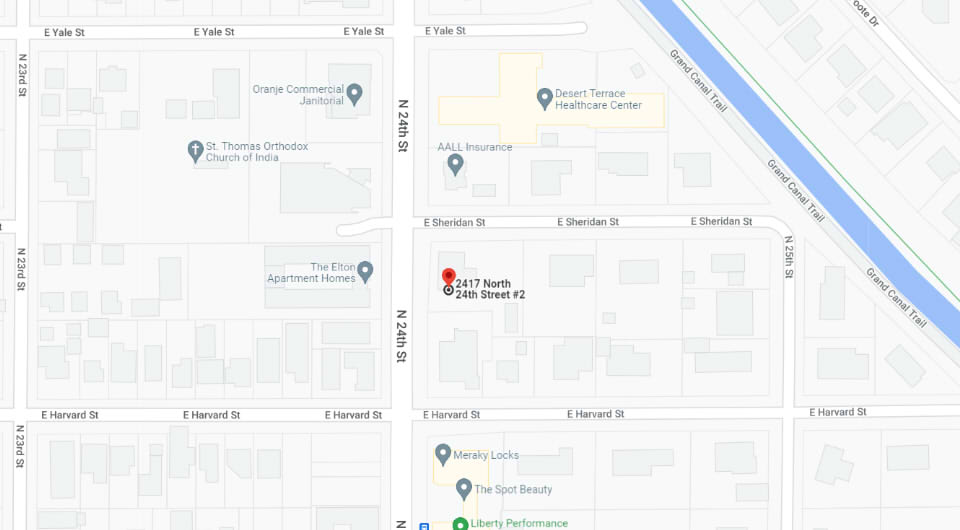Every day, Arizona patients use medical devices their doctors prescribe to them. They do this expecting the devices will enhance their health and not worsen it, and reasonably so. However, in many cases, the devices inflict injuries on patients rather than helping them. Medical device manufacturers make millions of dollars by selling their products. However, they should ensure their products are safe for their intended purpose, failure to which they will be considered negligent.
Similarly, healthcare providers should be careful not to use medical devices that are already marked to be faulty and have a severe impact on a patient's safety and health, failure to which they will also be considered negligent. When healthcare providers use defective medical devices, they risk lives. Patients could sustain severe injuries or even die.
If you have suffered a severe injury or your loved one dies because of faulty or failed medical equipment and the negligence of a healthcare provider or device manufacturer, you are entitled to compensation. We work tirelessly at Phoenix Personal Injury Attorney Law Firm to ensure our clients have the support and resources to go against even the largest medical device manufacturers and established healthcare providers. Call us if you believe you have a case, and we will provide you with quality legal advice and representation.
Medical Device Injury Overview
Medical devices are equipment designed to prevent, diagnose, treat illnesses, or influence particular bodily functions. A medical device can significantly enhance the health of persons with chronic medical conditions. From implantable cardioverter defibrillators to artificial pacemakers, medical devices enable individuals to cope with chronic health conditions at home instead of being hospitalized.
Also, thanks to medical devices, people can live with health conditions that may have otherwise left them motionless or too sick to enjoy life satisfactorily. Implantable medical appliances are also utilized to boost deteriorated hearing and prevent pregnancy.
Whereas medical appliances have been widely used for decades outside the hospital, the intricacy of these appliances has increased to include dialysis machines, ventilators, and other complex medical implants and equipment now used outside the hospital.
And while all these pieces of equipment can improve the quality of life for the patient, their increased use, coupled with failed regulation policies by the FDA, has led to more than 1.7 million people being injured and eighty thousand people dying in the last ten years.
Previously, physicians had little details about how defective medical devices caused many deaths and injuries because of exemptions in reporting rules by the federal government. However, the FDA recently released this info to the general public via a database, implying that physicians have the legal duty to interpret and understand it and uphold their responsibility of protecting patients from injury.
Common Medical Devices that Can Injure Patients
Patients usually trust their physicians and other medical professionals with their lives. They believe that these professionals will make the best decisions regarding their well-being. Professionally, the patient-doctor relationship presumes the physician will comply with rigid professional health standards and administer treatment understandable by any other reasonable doctor to be of the highest standard under similar circumstances.
Patients anticipate their physician's treatment to improve their health or help them enjoy a quality life. Sadly, the medical pieces of equipment that some doctors recommend cause harm because of various factors, including:
- Defectively designed devices. That is properly manufactured devices, but whose design poses an unreasonable risk that may lead to injury. Medical device defects occur not only because of a mishap or error during the manufacturing process but also because the entire line of products is inherently dangerous.
- Defectively manufactured devices. This means a device that is improperly fabricated or compromised/damaged in some way during the manufacturing process. Although, the damage/defect could have happened at any point between the manufacturing company and the place the consumer received the equipment.
- Doctors who are not current on research emphasizing the injuries associated with the medical equipment
- Defectively marketed devices. This involves manufacturers failing to caution patients properly about the device's dangers. The medical equipment may have been manufactured correctly, its design perfect, and it was not deemed inherently dangerous. However, an injury could occur because the patient was not given accurate or adequate warnings about the possible danger the device poses or given enough instructions on the appropriate and safe use of the equipment.
Any of the above problems with medical devices can cause substantial harm, including creating the need for corrective surgical procedures and resulting in death, disability, and grievous danger. Some devices known to have recently caused significant injuries to patients are:
- Laparoscopic adjustable gastric band devices used for shrinking stomach capacity for weight loss purposes at times cut into the stomach itself, causing severe infection and injury.
- IVC (inferior vena cava) blood clot filters that stop blood clots from prematurely spreading to essential organs are known to break up or migrate in the body, causing significant harm.
- Cochlear implants cause balance problems, further hearing loss, and painful shocks.
- Power Morcellators meant to disintegrate tissue while still in the body are recognized to result in the quick spread of cancer while targeting tissues with undetected cancer cells.
- Gastrointestinal scopes utilized for diagnosing different digestive conditions cause severe infections passed from patient to patient.
- NuvaRing birth control device, designed to be a convenient and safe alternative to the daily pill, is known to lead to blood clots.
- DaVinci Surgical Robots that facilitate straightforward surgeries with tiny cuts are recognized to cause injuries and even death.
- The Transvaginal mesh used for treating incontinence and organ prolapse in women is known to lead to significant harm.
- Biomet metal-on-metal hip implants lead to metal poisoning in the blood and untimely device failure.
- DePuy metal-on-metal hip implants may release small metal pieces into a patient's body since the metals rub against each during movement. When this happens, it may lead to toxicity and untimely device failure.
Other devices include:
- Pacemakers.
- Defibrillators.
- Knee implants.
- Hernia mesh.
- Dialysis filters.
- Drug-coated stents.
Physicians have the legal duty to know about the latest information and research, including the risks linked to the above and other devices. Additionally, they are required to provide patients with any info regarding the medical equipment they are recommending, including the known hazards linked to the equipment, to enable the patient to make well-informed decisions.
Physicians must also be familiar with their patient's full medical history. They must know when a given patient is an unsuitable candidate for certain medical equipment and when utilizing that equipment could expose them to significant injury or death.
Medical Device-Related Injury Treatment
Doctors should treat medical device-related injuries on time. A doctor does not only bear the duty of being up-to-date with the latest information on medical equipment safer and complying with the strict standards of care. They additionally owe their patients a duty of care that entails paying attention to their complaints about symptoms, investigating potential causes, correctly diagnosing them, and administering treatment on time.
Some doctors employ 'medical gaslighting' tactics. Medical gaslighting happens when a doctor brushes off their patient's complaints, does not treat them with seriousness, or blames the complaints for the wrong cause. This kind of conduct from a physician can lead to a patient doubting themself and remaining silent rather than reporting additional symptoms for their condition.
When a physician does not treat your complaints about symptoms seriously, does not order the correct diagnostic tests, or does not treat your medical device-related injuries faster to minimize them, they are considered negligent. You can therefore sue them for damages.
Holding Medical Device Manufacturers Accountable
Medical devices are only released to the market after several rounds of research and testing. Medical device manufacturers must complete these tasks to ensure their products are safe for consumption. Sometimes this research discovers unreasonable risks and dangers.
When the defects are uncovered, device manufacturers have the legal duty to recall the device from the market indefinitely or until the danger is corrected. However, shockingly, manufacturers frequently disregard these warnings, placing their profits before consumer safety. They avail medical devices they are aware are dangerous.
If a medical device manufacturer releases a piece of equipment into the market knowing it is dangerous, they are considered negligent. You can sue for damages if the manufacturer was negligent by selling a defective device and the device made you suffer injuries.
Steps to Take If a Medical Equipment Has Made You Suffer Injuries
If you sustained an injury after using medical equipment, your primary focus should be improving your medical condition, managing your pain level, and restoring your functioning and health. By following these steps on time after you have been injured, you can start to move past your medical-related accident and towards financial and physical wellness:
- Seek help from a trusted physician soon and stick to their advice fully. Ask for comprehensive notes about your injury, what caused it, and the suggested treatment option and prognosis.
- Keep all medical bills and records safe.
- Have a journal documenting all aspects of your medical device injury, the extent of your pain, and how your injury has affected your life.
- Ask the surgery center, clinic, or hospital that used or installed the medical device for comprehensive records and reports of your surgery, procedure, or treatment.
- Call a medical device injury attorney experienced in injuries caused by medical devices.
The most critical steps toward emotional, financial, and physical recovery are the initial steps towards recuperating from injuries caused by a medical device due to the negligence or malpractice of the device manufacturer or doctor.
How an Attorney Can Help
An Experienced medical device injury attorney knows how they can help you build a case against the negligent party. They can assist you in navigating the legal system within the stipulated statute of limitations with a well-developed and executed strategy to prove fault in your case. Your attorney can assist you by:
- Collecting evidence and investigating the specific circumstances surrounding your case— a skilled lawyer comprehends the approved standards of health care. They will gather the relevant evidence and review material pertinent to the case to establish whether a healthcare provider or medical device manufacturer breached the standards and should be held responsible.
- Consulting an expert witness— your lawyer can also subpoena an expert witness to assist them in determining if the approved standards of health care were breached and testify in your favor. A skilled lawyer would know an expert witness that can add value to your claim or lawsuit.
- Evaluating your losses— your lawyer can document all your financial losses because of the medical device harm you suffered. Additionally, they can calculate the non-monetary losses you suffered, including emotional distress. They can then use this info to evaluate the compensation amount to demand.
- Negotiating with the insurance company— your lawyer can send the liable party's insurance company a demand letter and skillfully negotiate with them for a fair settlement, which is challenging without prior experience and aggressiveness. Insurance companies will employ different tactics to deny or reduce your claim. An experienced medical device injury attorney would know how to counter those tactics, substantially increasing your likelihood of recovering fair compensation. If the insurer refuses to settle with a fair amount, your lawyer can file a lawsuit before the court and fight for you to receive the maximum possible compensation for all the losses you have suffered.
Unfortunately, monetary compensation will not undo your injuries, reverse your disability, or bring your deceased family member back to life. However, it can assist you and your family move forward, knowing you obtained justice and have more significant financial security.
Recoverable Damages in Medical Equipment Injury Cases
If you have been hurt by using medical equipment, you are likely facing substantial medical bills and have lost income because of the missed months, days, or weeks of work. You could also have a diminished capability to earn a decent living in the days to come because of the impact with which your injury has left you. If you file an insurance claim or lawsuit and win your case, you can recover the following three types of damages by either negotiating a settlement amount with the liable party's insurance provider or via an award by the court:
Economic Damages
Economic damages are also called special damages. They cover your monetary losses. They compensate for things such as:
- Present medical expenses.
- Future medical costs for ongoing physical therapy, corrective surgery, treatment, and any other home healthcare deemed necessary.
- Transport expenses for traveling to and from treatment centers, hospitals, and doctors.
- Present and future lost wages.
- Out-of-pocket expenses.
- Reduced ability for future earning.
Non-economic Damages
Non-economic damages are also called general damages, and they are more subjective. They compensate for things like
- Mental anguish.
- Emotional distress.
- Loss of enjoyment of life.
- Loss of companionship.
- Disfigurement or scarring.
- Pain and suffering.
Punitive Damages
Instead of compensating the victim, punitive damages are simply meant to punish the liable party for their negligence. Generally, you will only recover economic and non-economic damages. However, in some instances, you might recover punitive compensation.
For example, if your lawyer can demonstrate the manufacturer was aware of the risk the medical equipment posed but intentionally concealed this risk or delayed recalling it from the market, you might be awarded punitive damages as punishment to the device manufacturer for their intentional or malicious reckless behavior.
Recoverable Damages for Wrongful Death Resulting from a Medical Equipment Injury
If your family member died due to an injury resulting from medical equipment, you could file a wrongful death claim or lawsuit to pursue compensation. Wrongful death lawsuits or claims are brought by the deceased's closest family member and generally lead to compensation recovery for these damages:
- Medical costs incurred before the victim's demise.
- Burial and funeral expenses.
- Lost consortium and companionship the deceased would have provided.
- Lost future wages.
- Suffering, anguish, grief, and pain.
- Loss of care and support if the decedent was a parent of minor children.
Whereas compensation cannot bring the deceased back to life, it can assist in securing the decedent's financial future and help the ones left behind to focus on grieving their loss.
The Statute of Limitations for Medical Device Injury Cases
The statute of limitation is a law that limits the period a victim has to bring a lawsuit after suffering some kind of loss or harm. In Arizona, the statute of limitations for medical device injury cases is two years from the date the victim knew or should reasonably have known about the injury.
Various circumstances could extend the two-year timeframe for filing a medical device injury lawsuit. For example, the clock is tolled if the victim is mentally disabled or below eighteen years. Unless one of the exceptions applies to your case, filing your lawsuit after two years have elapsed may lead to the court denying your suit. Therefore, you should be keen on the two-year timeframe and consult an attorney as soon as you reasonably believe you have suffered harm due to a defective medical device.
Find a Phoenix Personal Injury Attorney Near Me
At Phoenix Personal Injury Attorney Law Firm, we can help you recover the damages you deserve if you have sustained an injury due to a defective medical device. We offer cost-free consultations and accept most defective medical device injury cases on a contingency fee basis. Contact us at 602-641-9589 to share your case today.










